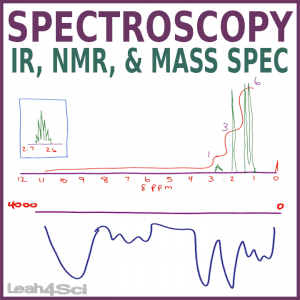 Your organic chemistry class is just around the corner.
Your organic chemistry class is just around the corner.
You're hoping, planning, committing, Hey, you're reading this Organic Chemistry Study Guide! You have the best intentions… you want to get an A!
These are great steps.
And they work.
But they’re all hypothetical!
At least until the semester begins and you actually have a chance to take action on your goals!
Why not turn your motivation into action BEFORE the semester begins?
If you’re reading this one month, one week, or even one day before your semester begins, you still have the opportunity to start your class prepared and ready to go.
How?
By understanding what’s coming and previewing material for the upcoming semester.
Organic Chemistry Study Guide, I mean, PRE-study guide
The more you understand going in,
The more you follow along in class,
The less confused you are,
The faster you get to practice,
And the less overwhelmed overall.
So let’s break it down!
What to Pre-Study for the Upcoming Organic Chemistry Semester:
First, do you have a syllabus?
If not, can you…
- Email your professor to get one in advance?
- Google an older syllabus from the same professor to understand their sequence of topics and what’s covered on each exam?
- No luck? No worries! Use my Orgo Syllabus Companion for now.
With one of these in front of you, you’ll want to create a pre-semester orgo study schedule with specific daily and weekly study goals.
As you plan, consider which of these defines you:
- Student retaking orgo 1 or 2 after a low grade, failure or withdrawal
- Student taking organic chemistry 1 for the first time
- Student taking organic chemistry 2 for the first time
Retaking the Course
If you’re retaking orgo, your approach will be similar to first-timers with one major difference.
You need to think back to your last orgo semester and figure out exactly what went wrong.
What happened that didn’t allow the course to turn out as you desired?
Was it an outside factor such as a personal event or emergency?
Or, was it related to how you approached your schedule, the overall semester, or the material?
Think about what went wrong and figure out what you have to change this time around.
Commit to it right now.
In terms of content, the rest will be similar to students taking orgo 1 or 2 for the first time.
Concerned about motivation and focus?
I have ADHD and have found the following ‘ADHD Trifecta' to be a game-changer for focusing when my brain is all over the place.
- Gamify your studying while implementing sanity breaks using the Pomodoro Method
- Keep a distraction list nearby for ‘mental permission' to let thoughts go for now
- Using a timer tracking app like toggl (explained in this video)
Let's start with Orgo 1.
Followed by Orgo 2.
Organic Chemistry 1 Review For First Time Orgo 1 Students
In over a decade of working with thousands of orgo students, I’ve noticed the following topic trends in organic chemistry 1:
First week: Review of General (inorganic) chemistry concepts.
This gives students a false sense of confidence.
“I’ve seen this before. This is not so bad.” = Mental disconnect!
Despite hearing the rumors of orgo’s high rate of failure and withdrawals.
Second week: Starting to transition, still gen-chem = confusion.
Why did they say it was so hard? It feels a bit more difficult compared to gen chem…but I don’t get it.
And then… the floodgates oooppenn.
The material starts to pile on at an alarming rate, putting students in a daze.
Then the first exam rolls around…
The first organic chemistry 1 exam is notoriously low-scoring across the globe.
My first orgo 1 exam (the time I withdrew) had a class average of 27.
(I scored a 56 which gave me a false sense of confidence and started my downward spiral, which ultimately led to a choice between failure and withdrawal…. I chose the W.)
The first exam is usually the wake-up call.
Students quickly scramble to catch up in order to bring up their scores by exam #2.
Many succeed.
Many fall hopelessly behind.
Forget the first exam wake-up call!
Let’s make this Organic Chemistry Study Guide your wake-up call!
Now that you'll know what to expect, let’s conquer this head on and have YOU destroying the grading curve on your first exam.
But first, if you haven't already, make sure you download my Organic Chemistry Study Guide Cheat Sheets below
Fly through everything or cover just a little bit?
In a perfect world, you will have time to pre-study every organic chemistry 1 topic prior to day 1.
I have maybe 2 students a year who pull this off by studying over the summer.
Can’t do it? Don’t feel bad!
The ideal orgo 1 pre-study goal:
Show up to class on day 1, ready to ace your first exam.
Too much?
Try for at least a basic understanding of first exam materials.
Minimal Pre-Study Goals for Limited Prep Time
Your orgo 1 professor will expect you to have covered some basics in General Chemistry.
Your gen chem professor may have assumed you’ll cover it in orgo….
Each one passes the buck, leaving you stranded in the middle.
If time for nothing else, aim to review the following topics, starting with 1-4 below:
(Follow the linked topics to my tutorials, videos, cheat sheets and more.)
Study Hall Members: Review these member-only videos for a walkthrough of pre-study topics. (Not a member yet? Join here)
 Understand atom and element basics.
Understand atom and element basics. - This includes structure of the atom, periodic trends, and orbitals.
- Focus on logic/understanding because orgo is all about atoms attacking and getting attacked.
- Understand how and why they react – from a valence perspective.
Review electron configuration, octet rule and Lewis dot diagrams. - Understand bonding and molecular structure.
- Review bonding: polar covalent, non covalent, and ionic bonds
- Carefully review hybridization and molecular geometry
- Take a look at the basics of Molecular Orbital Theory
- Review how to draw Lewis structures.
If you get through nothing else but the above topics, you can already consider your pre-studying a success. The videos linked above will take no more than 2-3 hours if you don’t have time to sit and practice.
Yes, practice is ideal, but you’ll still be ahead with just a video review. Want a quick overview of the most important Gen Chem topics for Orgo? Make sure to watch this one:
Ready to get even further ahead?
A few more must-review topics include:
5. Functional groups: know them, recognize them, memorize them.
6. Skeletal structures: Understand them, master them, learn to love them.
7. Formal charge Shortcut: Books and professors like to confuse you on purpose. My shortcut makes it so easy, and it’s actually fun.
And now we get to the serious (Read: Less simple) orgo 1 topics. These are typically covered in order as one concept builds on the next.
Aim to review and understand, turning each additional topic mastered into another bonus for the new semester – taking you just a few steps closer to acing exam #1.
8. Resonance Structures
-
- First review carbocation stability.
- Then, take some time to really master resonance. This topic will show up over and over and over in organic chemistry 1 and 2.
9. IUPAC Nomenclature – naming organic compounds
-
- Some professors skim over this quickly. Others will spend a few lectures on it.
Regardless of how strongly it’s tested up front, weakness in naming will haunt you down the line. Let’s make it solid.
Exam questions may read as follows: “Using only (molecule name) as your source of carbon, synthesize (molecule name). Show all reagents and intermediates.”
If you’ve studied your reactions and know what to do, do you really want to get stuck on this question because you forgot what those names represent?
- Some professors skim over this quickly. Others will spend a few lectures on it.
10. Isomers, including cis/trans and E/Z – Some will cover this earlier with Lewis structures. Some will cover this after naming.
Time for Exam #1
Many students will reach about this point for exam #1. Some will also see acids and bases on their first exam.
If you dreaded this topic in general chemistry due to intense calculations, ICE charts and buffer equations, you’re in luck! No acid/base math in orgo (except for lab)!
Instead, organic chemistry acid/base is all conceptual evaluation and your introduction to reactions (and perhaps even mechanisms).
Review the basics, the big concepts, and master CARIO (my mnemonic taught in the linked series above) like your life depends on it.
This will show up over and over in both orgo 1 and orgo 2.
If your professor is really pushing it, you may also see the following 2 topics on exam #1. (Most students will not.)
Molecular Analysis and Stereochemistry
Let’s proceed with a warning: this is where things start to get difficult. (Don't worry, I have plenty of helpful links below)
If you’re pre-studying, only dive into these topics if you can devote quite a few hours to getting it.
If you can’t, then you’re much better off simply mastering the above very well and leaving this for later.
By acing your first exam, you’ll be in the right mindset (and not worrying about your grade so much since you did well) to start working on this after your previous exam but before your tackle these topics in lecture.
Organic Chemistry Model Kit or No Model Kit?
The Million Dollar Question!
My advice: YES! Definitely get a model kit ASAP. In fact, the video above walks you through how to use it. But first, read this to avoid falling into the model kit trap.
Ready?
- Molecular/Conformational Analysis: Newman Projections and Chair Conformations
- Chirality and Stereochemistry
These are some of my favorite topics! I typically teach a LIVE workshop on this every semester around the time when most students cover this in class.
(I sometimes post the announcement on social media but email subscribers always hear about it first. Click HERE to Subscribe and get my free Orgo Tips ebook)
- Also consider looking at Fischer Projections, which is covered in this chapter by about 50% of orgo students.
And THAT is all I recommend Pre-Studying to Ace Orgo 1!
Unless you have time to complete all of orgo 1, I recommend stopping here.
Use the extra time to go back to the beginning and review everything again.
Get a head start on practice problems using the in-chapter questions in your textbook.
Or, if you don’t yet know which book is required for your class, pick up a supplementary resource such as the ACS Organic Chemistry guide. Even if you're not taking the ACS exam, it is still a great practice resource.
(What is it? Or know for sure you're taking it? Read: How to Prepare for the ACS Exam.)
Have more time? Continue your Orgo 1 review in this order.
Yes, even if your syllabus follows another sequence – I find this order to be more logical in terms of building upon a foundation of the previous chapters.
Reactions and Mechanisms – here we go.
Start with electron pushing arrows (and a quick review of resonance).
Then study these reactions in order:
a. Introduction to Mechanisms
b. Alkene Reactions and Markovnikov’s Rule
c. Alkyne Reactions
d. Substitution Elimination Reactions
e. Radical Reactions
f. Synthesis and Retrosynthesis
Students Preparing for Organic Chemistry 2
If you’re taking organic chemistry 2 this upcoming semester, I will assume you skipped over the orgo 1 materials above. Go back and skim through it quickly, asking yourself these questions with every topic:
How do I feel about this topic?
Do I remember it well enough or can I benefit from an Orgo 1 review for Orgo 2?
If I had to take a quiz on this tomorrow, can I score at least 90%?
If not, consider taking the time to review.
Looking for a quick refresher on all of the important Orgo 1 reactions?
Watch below for a breakdown of each reaction, including reagents, conditions, and major or minor products formed.
Is Orgo 2 Easier or Harder Than Orgo 1?
There are arguments to be made for both levels of organic chemistry being more difficult.
Many students struggle with orgo 1 initially because it’s a new way of thinking, learning, and studying. It’s a new style of learning from anything else you’ve ever experienced.
Once you get the style, then it’s simply a matter of continuing to learn, practice, and put in the hard work topic after topic.
It doesn’t get easier per se, but it simply becomes…more doable.
Orgo 2 vs Orgo 1? It's kinda more of the same.
More advanced reactions,
Lengthier mechanisms,
Crazy multi-step synthesis problems.
Think of orgo 2 as orgo 1 on steroids.
If you mastered the orgo 1 approach and are willing to put in the effort, orgo 2 should be quite doable for you. Just remember, doable doesn’t mean easy.
Rebuild Your Foundation
I’ve worked with many orgo 2 students who have struggled with or forgotten topics learned in orgo 1.
And as much as they tried to keep up with their orgo 2 class, their orgo 1 weaknesses kept coming back to haunt them.
If it’s been a while and you’ve forgotten orgo 1 or if you struggled with it last term, take the time to review the foundation.
If it’s a choice between reviewing orgo 1 or pre-studying orgo 2,
I will argue that you’re better off JUST working on rebuilding that orgo 1 foundation.
This will ensure that you are solid on the basics and that you won’t get stuck on advanced orgo 2 problems that require an orgo 1 background.
Your orgo 1 review will initiate a positive momentum before classes even begin so that you’re ready to conquer more and more advanced mechanisms.
For students who need just a bit of review, I will recommend specific orgo 1 topics to brush up on for each of the following orgo 2 chapters below.
Reviewing the old right before studying the new will help you tie it all together.
Unlike organic chemistry 1, there is no obvious ‘first chapter.’
Orgo 1 slowly leads into the functional group reactions (alkenes, alkynes…). Orgo 2 continues from where you left off.
The typical orgo 2 syllabus begins with one of the following 3 topics:
- Spectroscopy
- Conjugation, aromaticity, and EAS reactions
- Reactions of alcohols, ethers, and epoxides
If you have a syllabus, jump right to the designated next topics.
No syllabus? Attempt a basic overview of all 3. This will give you a foundation to build upon once classes begin.
Spectroscopy
I won’t sugar coat this for you. Spectroscopy is a beast. It is THE MOST DIFFICULT orgo topic, in my opinion.
Unlike everything prior, this isn’t so much about molecules reacting or mechanisms.
Spectroscopy is a laboratory analysis technique that, for our purposes, involves reading crazy graphs to determine molecular structures, functional groups, and more.
If your syllabus has this next, go crazy.
Study nothing else if you don’t have too much time.
If unsure what’s next, only cover the basics.
Get the ‘what the heck is going on’ question out of the way and be prepared to work hard once this topic officially rolls around.
The basics include an introduction to H-NMR and IR, and a brief scan through C-NMR and mass spec.
Aim to simply ‘get’ the background. Then, focus on learning how to read and understand the graphs.
Conjugation, Aromaticity, and EAS
This topic doesn’t follow the typical flow of ‘reactions building on reactions’ because it's not connected to what you've done so far.
This is why some professors cover this late in Orgo 1, at the start of orgo 2, or even at the end of orgo 2.
Required Orgo 1 Foundation for this topic:
- Carbocation Stability
- Resonance
- E1/E2 Reactions
- Alkene Reactions and Markovnikov’s rule
- Understanding of CARIO (acid/base chapter)
Not sure if this is next? Focus on the basics.
- Study thermodynamic vs kinetic reactions and the Diels-Alder reaction.
- Then, jump into aromaticity.
- For EAS, review the basics including the mechanism for the 5 main reactions and the concept of Ortho Meta Para Directing Effects.
If this IS next,
- Review the orgo 1 concepts above.
- Then, study the 3-4 chapters in your book covering conjugation, aromaticity, EAS reactions and NAS if covered. (Some skip it.)
Alcohols, Ethers, and Epoxides
If your syllabus follows the ‘more reactions’ theme, you’ll recognize that you cover functional groups in terms of increased level of oxidation, alcohols/ethers/epoxides, then ketones and aldehydes, and then carboxylic acids and derivatives.
Each of these chapters will follow this type of pattern:
- Review of functional group specifics
- Naming said functional group
- Physical properties of this specific group including solubility and melting/boiling points
- Reactivity, especially if acidic or basic
- Synthesis of said functional group, if covered previously (for example alcohols from alkenes)
- Reactions, reactions, mechanisms and even more reactions
Many students forget the basics going into orgo 2. Don’t let this happen to you!
Required Orgo 1 foundation for alcohols, ethers, and epoxides:
- Physical properties including solubility and boiling point
- Alkene and alkyne reactions – especially how to form alcohols, ethers and epoxides
- Review related nomenclature
- Learn/review oxidation of alcohols
- Review SN1/SN2 reactions
- Focus on the early part of the chapter which will emphasize pre-reaction basics.
- Then, skim through the reactions/mechanisms to understand the gist without memorization.
After the 1-2 chapters on alcohols, ethers, and epoxides, some will also study sulfides and thiols. If this is on the syllabus, study them in detail. This would be half to 75% of your first exam.
Many professors jump around after this.
Some continue with carbonyls. Others jump to one of the 2 other topics listed above: Conjugation/Aromaticity or Spectroscopy.
If continuing with carbonyls, your next topic will be Aldehydes and Ketones.
Review your orgo 1 basics for ketones and aldehydes.
- Review related functional groups
- Review related nomenclature
- Review SN1/SN2 reactions
- Review alkyne reactions with a focus on the KET (Keto Enol Tautomerization) reaction and mechanism
Foundation in hand, work through the chapter. Go through reaction by reaction, trying to understand the steps in every mechanism.
More importantly, look for similarities in the reactions, mechanisms and pattern of the products for each reaction.
This is where students get overwhelmed, thinking they have to learn hundreds of reactions.
In reality, once you find the patterns, you simply have to study the overall ‘pattern theme’ which allows the individual pieces to slowly fall into place with practice.
Two More Key Orgo 2 Topics
There are 2 more topics covered in organic chemistry 2, but not taught in any particular order.
Some books have a dedicated chapter. Others will simply list it as one of the sub-reactions for that functional group.
 Instead of being confused, why not study these in advance so that you can apply it to every chapter as it comes up?
Instead of being confused, why not study these in advance so that you can apply it to every chapter as it comes up?
- Oxidation and Reduction
- Organometallics with an emphasis on the Grignard reactions
Unless you have time to preview all of orgo 2, this is where I recommend stopping.
The later reactions are intense, complicated, and build on the foundation created up to this point.
If you want to continue, I would suggest that your time will be better spent going back to everything listed above for a second time. This time, focus in-depth on studying reactions, reagents, and practicing mechanisms.
Having this foundation will ensure you never fall behind and never feel overwhelmed, so that when you do get to the later chapters, you’re ready and able to quickly pick up the new material.
I’ve tried to link to as many helpful resources for each of these topics. However, most of what I have on my website and YouTube Channel is just a review of the basics.
The Organic Chemistry Study Hall was created for students looking for more guidance, more in-depth tutorials on each topic, along with practice questions and explanations.
Click for full Study Hall details
I want to hear from you!
When does your orgo semester begin? Let me know in the comments below.





Thank you so much for sharing this study guide! I’m currently preparing for my organic chemistry exam and this guide has been incredibly helpful in organizing my notes and identifying areas where I need to focus my studying. Your tips on creating a flashcard system and practicing past exams have given me a lot of confidence for the upcoming semester. Great job on creating a useful and informative post!
Hi, Leah: I so happen to stumble on your site when I started getting nervous about taking Organic Chemistry for next fall. I need some advice here. Its been about 3 years since I took General Chemistry and passed with flying colors. How should I go about getting ready to take Organic Chemistry for next fall of 2020′? My study habits have always been on point I just need to know where to start. I still have my chemistry book to study too. I just don’t want to over study general chemistry either.
THANK YOU
Basic organic chemistry. 2
Super super super helpful
So glad you found it helpful Memana. With >1 week to go you still have a chance to make serious progress before classes begin.